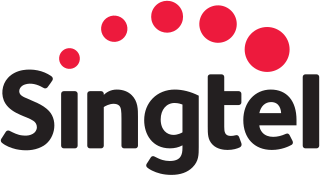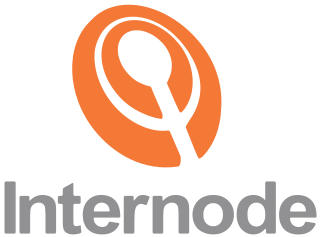
Integrated Services Digital Network (ISDN) is a set of communication standards for simultaneous digital transmission of voice, video, data, and other network services over the digitalised circuits of the public switched telephone network. Work on the standard began in 1980 at Bell Labs and was formally standardized in 1988 in the CCITT "Red Book". By the time the standard was released, newer networking systems with much greater speeds were available, and ISDN saw relatively little uptake in the wider market. One estimate suggests ISDN use peaked at a worldwide total of 25 million subscribers at a time when 1.3 billion analog lines were in use. ISDN has largely been replaced with digital subscriber line (DSL) systems of much higher performance.
Telecommunications in Latvia include radio, television, fixed and mobile telephones, and the Internet.
Telecommunications in Slovakia includes fixed and mobile telephones, radio, television, and the Internet.

Telecommunications infrastructure in South Africa provides modern and efficient service to urban areas, including cellular and internet services. The Independent Communications Authority of South Africa (ICASA) is the watchdog of the telecommunications in the country.

Telstra Group Limited is an Australian telecommunications company that builds and operates telecommunications networks and markets voice, mobile, internet access, pay television and other products and services. It is a member of the S&P/ASX 20 and Australia's largest telecommunications company by market share. Telstra is the largest wireless carrier in Australia, with 18.8 million subscribers as of 2020.
Singtel Optus Pty Limited is an Australian telecommunications company headquartered in Macquarie Park, a suburb in the Northern Sydney region of Sydney, New South Wales, Australia. It is a wholly owned subsidiary of Singaporean telecommunications company Singtel.

Singapore Telecommunications Limited, commonly known as Singtel, is a Singaporean telecommunications conglomerate and one of the four major telcos operating in the country.

Internode Pty Ltd is an Australian Internet service provider (ISP) that provides NBN broadband services, business-class broadband access, web hosting, co-location, Voice over IP, and a variety of related services. Internode became part of TPG Telecom in July 2020.
Telkom SA SOC Limited is a South African wireline and wireless telecommunications provider, operating in more than 38 countries across the African continent. Telkom is majority state-owned (55.3%) with the South African government owning 40.5% of Telkom, while another 14.8% is owned by another state-owned company - the Public Investment Corporation (PIC), which is closely linked to the South African government.

Internet Protocol television (IPTV) is the delivery of television content over Internet Protocol (IP) networks. This is in contrast to delivery through traditional terrestrial, satellite, and cable television formats. Unlike downloaded media, IPTV offers the ability to stream the source media continuously. As a result, a client media player can begin playing the content almost immediately. This is known as streaming media.
A naked DSL, also known as standalone or dry loop DSL, is a digital subscriber line (DSL) without a PSTN service — or the associated dial tone. In other words, only a standalone DSL Internet service is provided on the local loop.

TelstraClear Limited was New Zealand's second-largest telecommunications company before being acquired by Vodafone New Zealand in October 2012, previous to which it was a subsidiary of Australian company Telstra.

Telenor Sverige, is a mobile phone, IPTV and Internet service provider in Sweden, owned by Telenor. Telenor Sverige's network covers 99 percent of the country's population, with telecom infrastructure sharing on 2G, 4G LTE and 5G NR under the Net4Mobility joint venture with Tele2, and on 3G UMTS with 3 Sverige outside Stockholm, Gothenburg, Malmö, Lund and Karlskrona, where it has its own 3G masts. Today, Telenor Sweden has over 2.5 million mobile subscribers, approximately 645,000 broadband customers and half a million TV customers. Telenor Sweden has a turnover of approximately SEK 13.1 billion (2015) and has approximately 1,900 employees.
BT Wholesale and Ventures was a division of United Kingdom telecommunications company BT Group that provided voice, broadband, data, hosted communication, managed network and IT services to communications providers (CPs) in Great Britain. It was merged with BT's Business and Public Sector division to form BT Enterprise in October 2018.
In Singapore, there are 11,512,900 broadband Internet subscribers. There are three major Internet service providers in Singapore, namely, Singtel, StarHub, and M1 and other growing providers like MyRepublic and ViewQwest. Over the years, the Singapore Government has been promoting the usage of broadband Internet access, as part of its Intelligent Nation 2015 (iN2015) and Smart Nation initiative.
The Internet in Norway is available through Fiber or Mobile. The country code top level domain is .no.
The Internet in Portugal achieved a penetration rate of about 64% of the population in 2012. With an average peak Internet access speed of 34.5 megabits per second, Portugal stood seventeenth on the list of countries with the fastest Internet access.
Telio is a Norwegian telecommunications company that provides VoIP telephony services in Norway, Denmark and the Netherlands with a total of 200,000 customers, making it the second largest VoIP service provider in Norway, after Telenor. It is also a virtual supplier of GSM mobile subscriptions.

iPrimus is an Australian telecommunications company and wholly owned subsidiary of Vocus Communications.
TelOne Zimbabwe is a parastatal telecommunications company owned by the Zimbabwe government headquartered in Harare's Central Business District. It is the largest telecom entity in Zimbabwe and has the second largest fixed-line network in Southern Africa after Telkom South Africa. The parastatal is Zimbabwe's sole fixed landline services provider.








